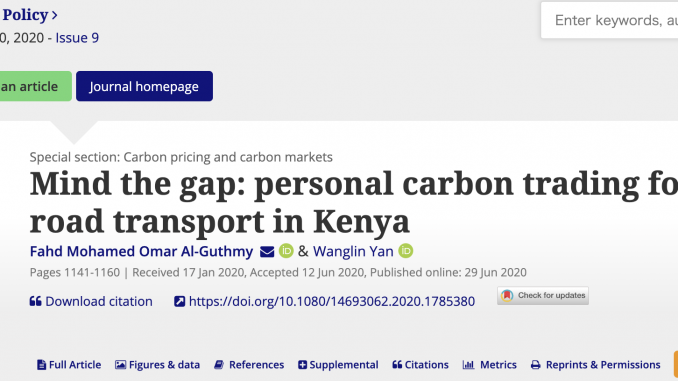
Fahd Al-Guthmy
Climate policy instruments have received significant interest both politically and academically as necessary tools to mitigate rapidly growing emissions. Of particular concern is road transport, which is yet to be included into any emissions trading system. Personal carbon trading (PCT) is an alternative policy to the unpopular carbon tax but lacks developing country consideration. To consider PCT in a new context, social justice concerns must be addressed and the cost and administrative complexities barring its implementation need to be resolved. Hence, this research investigates the practicality of PCT for personal road transport in Kenya. Since literature has relied on the resourcist approach when assessing the distributional impact of quota allocation, this study complements current works by developing a needs-based allocation based on the welfare approach. This study is also the first to address cost concerns by using a case study approach of a mobile service provider – Safaricom. Three quota allocation methods are modelled using data from a survey to 500 motorists. The equal per-capita, equal per-vehicle and needs-based allocation methods undergo microsimulation modelling to identify equity issues associated with several socio-demographic factors of interest. To estimate running costs, the survey data is combined with Safaricom’s financial reports and a Monte Carlo simulation is performed. The findings suggest that PCT would be highly progressive. The needs-based model is shown to deliver energy sufficiency whilst retaining progressivity and may be worth considering when stricter allocation becomes inevitable. The cost projections reveal the mobile phone-based system to be a fraction of the running cost of previously proposed chip card systems and additionally eliminates the burden of set up costs when the operation is outsourced to the mobile service provider. This work is intended to provide researchers with a viable, globally-inclusive variant of PCT and to influence its reconsideration by policymakers.
- Al-Guthmy, F. M. O., & Yan, W. (2019). Meeting Nationally Determined Contribution Targets: Projecting Kenya’s Motor Vehicle Emissions. Low Carbon Economy, 10(2), 31–46.
- Al-Guthmy, F. M. O., & Yan, W. (2020). Mind the gap: personal carbon trading for road transport in Kenya, Climate Policy, DOI: 10.1080/14693062.2020.1785380. Climate Policy. https://doi.org/10.1080/14693062.2020.1785380
- Al-Guthmy, F. M. O., & Yan, W. (2019). The Road to a Downstream Emissions Trading System: Designing a Scheme Combining Motorist and Government Participation. Journal of Energy, 1–12.